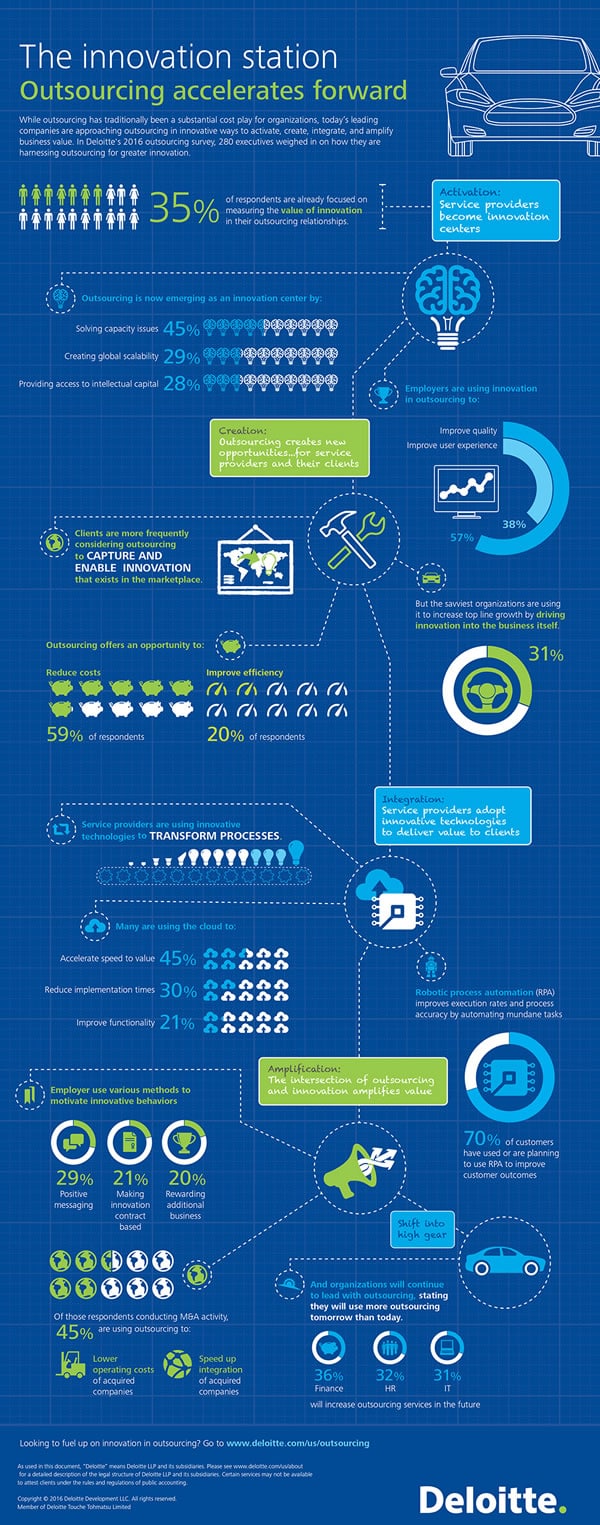There is a shift towards a cost plus value proposition in business process outsourcing (BPO). With the increasing push for all functions to focus more on the ‘business side’ of the organization, this evolutions transforms the BPO market itself. Yet, the same goes for various forms of business process outsourcing such as IT outsourcing.
IT outsourcing decisions are being reconsidered through the lense of this rapidly growing business pressure and most certainly the digital transformation agenda. Inevitably, this also means that specific activities and even technologies that used to be the domain of IT are being moved to managed services environments, whether it concerns security, connectivity or digitization from paper to process and outcome.
 Business process outsourcing and IT outsourcing: from saving money to making money
Business process outsourcing and IT outsourcing: from saving money to making money
Obviously managed services and IT outsourcing aren’t new but the landscape and rationale of increasing adoption are changing fast. Organizations are in the market for managed approaches and smarter outsourcing with BPO partners who understand their business needs and focus on helping them to achieve these business needs with clear SLAs and minimum hassle.
For these organizations, digitization, security and connectivity, to mention a few again, have become the very foundations in order to achieve their digital transformation and optimization goals, to improve speed and customer experience, to innovate and, simply said, to make more money.
The latter, making more money, is what businesses focus on and just as they expect IT and the CIO, as well as all others to ‘think more business’, they want their IT outsourcing and other business process outsourcing partners to achieve precisely that, in the now and in the future where transformation and innovation typically play more than direct optimization.
Where business process outsourcing in general once was mainly about costs, most BPO functions, including IT outsourcing, are now moving towards generating revenue and value.
The changing IT outsourcing priorities and the role of the CIO and IT as “connectors”
It might seem weird that, if things such as digitization, security and connectivity, are so crucial to organizations, they want to outsource them or find solutions and partners, to make sure they are sure these activities are done as good as possible. Isn’t it better in-house?
It becomes less and less possible in a technology- and information-intensive reality. And this where the high-end BPOs and service partners come in, as well as the changing role of CIOs and obviously a host of technologies, making it all possible. It’s that ‘digital CIO‘ – or anyone with a similar decisive role – who is a business partner. The CIO who 1) reconsiders his organization’s IT landscape from the viewpoint of business priorities and at the same time 2) reconsiders and builds new partnerships with partners which help him and the organization to bring this exercise to a good end, 3) keeps open lines with business-oriented BPO partners and 4) disposes of the dashboards needed to monitor and adapt performance of the various IT capacities through these dashboards giving him insight in the performance of the BPO’s activities and technologies.
When thinking about the technologies, enabling these forms of closer and stronger partnerships with IT outsourcers and BPOs in general, one obviously stands out: “the cloud“.
Every business is a digital business, it is said. Well, we would say that every business certainly is an IT business. And IT and business are more intertwined wth eachother and ecosystems of BPOs, IT outsourcers and partners than ever.
Technologies are omni-present and building the right partnerships with specialized partners and IT outsourcing companies de facto has become a solution for organizations to make sure that 1) IT/technology is a value creator, 2) that the organization can focus on the business and 3) even to keep up with technological evolutions that are needed to succeed – yes, IT outsourcing is about keeping up with disruptions too.
In the infographic below from Deloitte’s Global outsourcing survey 2016 you can find some additional takeaways. Note that this is for outsourcing in general and the effect of amplification: the intersection of outsourcing and innovation (part of the business) amplifies value.

Top image: Shutterstock – Copyright: Rawpixel.com

